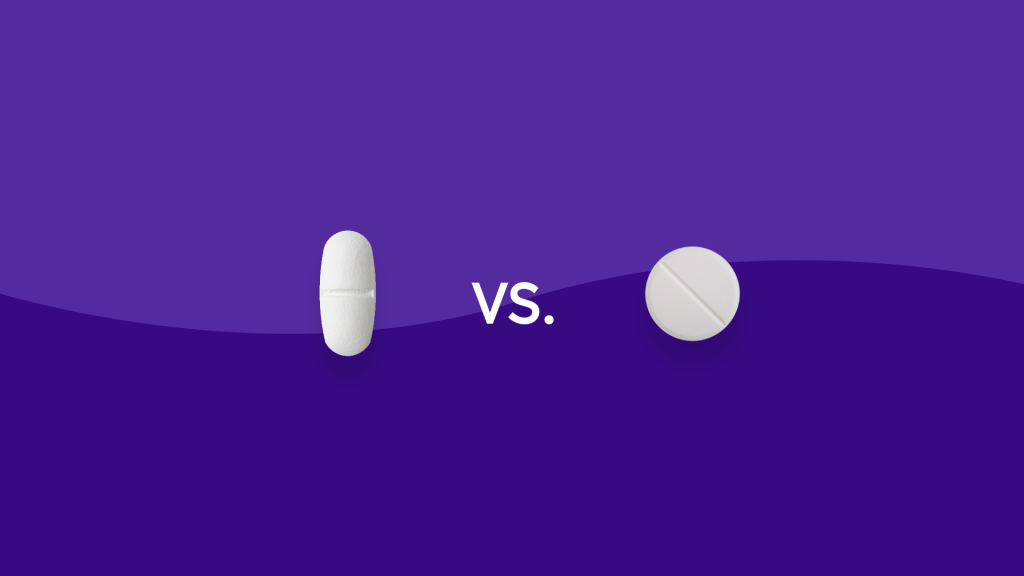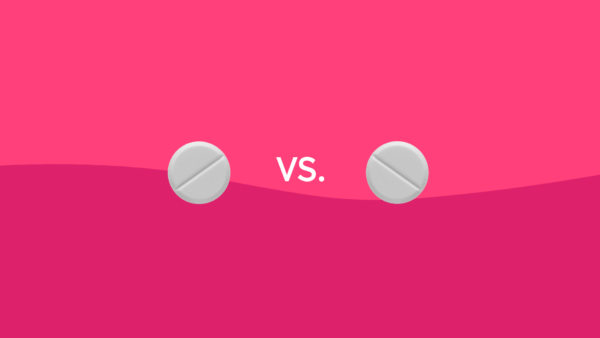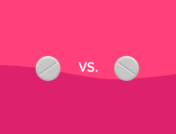Drug overview & main differences | Conditions treated | Efficacy | Insurance coverage and cost comparison | Side effects | Drug interactions | Warnings | FAQ
If you’re living with a sleep disorder like narcolepsy, you may need to take certain medications to help you stay awake. Nuvigil (armodafinil) and Adderall (amphetamine and dextroamphetamine) are prescription drugs that can help reduce excessive daytime sleepiness caused by narcolepsy.
Both drugs work as central nervous system (CNS) stimulants that can help improve wakefulness and increase alertness. The exact way in which they work is not entirely known. However, these stimulants are believed to indirectly increase the levels of certain neurotransmitters, such as dopamine and norepinephrine, in the brain.
Although they have similar effects and work in similar ways, Nuvigil and Adderall are dosed differently and have different formulations. They also differ in potential side effects and drug interactions.
Continue reading to learn more about how Nuvigil and Adderall are different and similar.
What are the main differences between Nuvigil vs. Adderall
They contain different active ingredients
Nuvigil contains armodafinil, the R-enantiomer of modafinil (known by the brand name Provigil). Armodafinil and modafinil are enantiomers or a pair of molecules that are mirror images of one another.
Adderall contains a combination of dextroamphetamine and amphetamine salts. Specifically, Adderall contains dextroamphetamine saccharate, dextroamphetamine sulfate, amphetamine aspartate, and amphetamine sulfate.
They have different formulations
Nuvigil is currently available as an oral tablet in strengths of 50 mg, 150 mg, 200 mg, and 250 mg. Adderall is available as an oral tablet in strengths of 5 mg, 7.5 mg, 10 mg, 12.5 mg, 15 mg, 20 mg, and 30 mg. Adderall also comes as an extended-release capsule called Adderall XR, which is available in strengths of 5 mg, 10 mg, 15 mg, 20 mg, 25 mg, and 30 mg.
They have different risks of abuse
Nuvigil is classified as a Schedule IV controlled substance by the Drug Enforcement Administration (DEA). Adderall is classified as a Schedule II controlled substance. In other words, Nuvigil carries a lower risk of abuse than Adderall. Those who abuse these drugs may develop physical or psychological dependence, especially if the drugs are not taken as prescribed.
They are dosed differently
Nuvigil is usually taken once per day. Adderall, on the other hand, may need to be taken up to two or three times per day to remain effective.
| Main differences between Nuvigil and Adderall | ||
|---|---|---|
| Nuvigil | Adderall | |
| Drug class | Stimulant-like drug Wakefulness promoting agent |
Stimulant |
| Brand/generic status | Brand and generic version available | Brand and generic version available |
| What is the generic name? | Armodafinil | Dextroamphetamine/levoamphetamine |
| What form(s) does the drug come in? | Oral tablet | Oral tablet |
| What is the standard dosage? | For obstructive sleep apnea or narcolepsy: 150 to 250 mg once per day in the morning For shift work disorder: 150 mg once per day 1 hour before starting work shift |
For ADHD: 5 mg once or twice daily. Dosage may be increased by 5 mg in weekly intervals For narcolepsy: 5 to 60 mg per day in divided doses Dosage may vary depending on the age of the person |
| How long is the typical treatment? | Long term or as directed by a physician | Long term or as directed by a physician |
| Who typically uses the medication? | Adults and young adults 17 years and older | Adults and children 3 years and older |
Conditions treated by Nuvigil and Adderall
Nuvigil is primarily used as a wakefulness-promoting agent. It is approved by the Food and Drug Administration (FDA) for sleep disorders, such as narcolepsy and shift work disorder. Nuvigil is also approved to treat obstructive sleep apnea (OSA).
Like Nuvigil, Adderall is FDA-approved for narcolepsy. However, Adderall is primarily used to treat attention deficit hyperactivity disorder (ADHD).
| Condition | Nuvigil | Adderall |
| ADHD | Off-label | Yes |
| Narcolepsy | Yes | Yes |
| Shift work sleep disorder | Yes | Off-label |
| OSA | Yes | Off-label |
Is Nuvigil or Adderall more effective?
Compared to placebo, Nuvigil and Adderall are effective prescription drugs for narcolepsy. There are few head-to-head studies, if any, that compare the effectiveness of Nuvigil and Adderall.
One study discussed the use of the active ingredients of Provigil, Adderall, and Ritalin for excessive daytime sleepiness. Stimulants, especially modafinil, may help accelerate recovery and improve sleepiness in people who are critically ill. While Nuvigil and Adderall are effective drugs, other alternatives are available and being developed to help relieve sleep disorders.
Nuvigil has a longer half-life than Adderall (15 hours versus 10 to 14 hours). Therefore, Nuvigil stays in the body with effects that last longer than those of Adderall. Nuvigil only needs to be taken as a single dose, while Adderall may have to be taken a few times throughout the day.
As with all drugs, it’s important to seek advice from a healthcare provider before taking a drug like Nuvigil or Adderall.
Coverage and cost comparison of Nuvigil vs. Adderall
Nuvigil is not usually covered under health insurance plans as a brand-name drug. Instead, some plans may cover the generic version of the drug. Without insurance coverage, Nuvigil can cost an average of $1,120 for 30, 250 mg tablets. Using a savings option like the SingleCare discount card for Nuvigil may help bring the cost down to around $40.
Adderall is not usually covered as a brand-name drug since a generic version is available. Most Medicare and insurance plans will help cover the cost of the generic version. Adderall can cost an average retail price of $315 for 30, 20 mg tablets. Using a Adderall SingleCare discount card could lower the cost to around $15.
| Nuvigil | Adderall | |
| Typically covered by insurance? | Yes, the generic | Yes, the generic |
| Typically covered by Medicare Part D? | Yes, the generic | Yes, the generic |
| Quantity | 30, 250 mg tablets | 30, 20 mg tablets |
| Typical Medicare copay | $15–$217 | $7–$78 |
| SingleCare cost | $40+ | $15+ |
Common side effects of Nuvigil vs. Adderall
The most common side effects of Nuvigil are headache, dizziness, nausea, and insomnia. The most common side effects of Adderall are stomach pain, decreased appetite, and anxiety.
Explore other side effects of Nuvigil and Adderall in the table below.
| Nuvigil | Adderall | |||
| Side Effect | Applicable? | Frequency | Applicable? | Frequency |
| Headache | Yes | 17% | Yes | * |
| Insomnia | Yes | 5% | Yes | * |
| Stomach pain | Yes | 2% | Yes | * |
| Decreased appetite | Yes | 1% | Yes | * |
| Nausea | Yes | 7% | Yes | * |
| Anxiety | Yes | 4% | Yes | * |
| Depression | Yes | 2% | Yes | * |
| Palpitations | Yes | 2% | Yes | * |
| Increased heart rate | Yes | 1% | Yes | * |
| Dizziness | Yes | 5% | Yes | * |
| Dry mouth | Yes | 4% | Yes | * |
| Diarrhea | Yes | 4% | Yes | * |
| Taste disturbances | No | – | Yes | * |
Frequency is not based on data from a head-to-head trial. This may not be a complete list of adverse effects that can occur. Please refer to your doctor or healthcare provider to learn more.
*not reported
Source: DailyMed (Nuvigil), DailyMed (Adderall)
Drug interactions of Nuvigil vs. Adderall
Nuvigil and Adderall can interact with many of the same drugs. If Nuvigil or Adderall is taken with a monoamine oxidase inhibitor (MAOI), there is a risk of hypertensive crisis or extremely high blood pressure that can lead to a stroke. Nuvigil and Adderall should be avoided with MAOIs or within 14 days of taking an MAOI.
Nuvigil and Adderall can interact with omeprazole, a drug often used to treat acid reflux. Taking Nuvigil and omeprazole can lead to increased levels of omeprazole in the blood, which may lead to increased side effects of omeprazole. Taking Adderall with omeprazole can lead to faster absorption of Adderall in the body, which may lead to increased side effects of Adderall.
Nuvigil may decrease the effectiveness of hormonal contraceptives. Healthcare providers may recommend using other methods of contraception while taking Nuvigil and for one month after stopping Nuvigil. Nuvigil may also decrease the blood levels and effectiveness of cyclosporine, an immunosuppressant used to prevent the rejection of a transplanted organ.
Taking amphetamines with serotonergic drugs like antidepressants can increase the risk of serotonin syndrome. Amphetamines can also decrease the effectiveness of high blood pressure medications. It is best to monitor the use of Adderall with serotonergic drugs and high blood pressure medications.
| Drug | Drug Class | Nuvigil | Adderall |
| Isocarboxazid Phenelzine Selegiline |
Monoamine oxidase inhibitors (MAOIs) | Yes | Yes |
| Omeprazole | Proton pump inhibitors (PPIs) | Yes | Yes |
| Ethinyl estradiol Norethindrone |
Hormonal contraceptives | Yes | No |
| Cyclosporine | Immunosuppressants | Yes | No |
| Sertraline Fentanyl Lithium Nortriptyline St. John’s wort |
Serotonergic drugs | No | Yes |
| Lisinopril Benazepril Candesartan Losartan |
Antihypertensives | No | Yes |
This may not be a complete list of all possible drug interactions. Consult a healthcare provider with all medications you may be taking.
Warnings of Nuvigil and Adderall
People with known cardiovascular disease, heart disease, or high blood pressure should use caution while taking Nuvigil or Adderall. Taking Nuvigil or Adderall may increase the risk of high blood pressure, increased heart rate, stroke, and heart attacks in people with cardiovascular disease. Seek immediate medical attention if you experience chest pain, fainting, or shortness of breath.
The use of Nuvigil or Adderall may increase the risk of psychiatric events, such as hallucinations, delusional thinking, mania, depression, and aggression. The risk of these events is higher in people with a history of mental health disorders, including bipolar disorder and depression.
In rare cases, Nuvigil or Adderall can cause an allergic reaction. Serious skin rashes, such as Stevens-Johnson syndrome, have also been reported with the use of Nuvigil and Adderall.
The use of Adderall carries a risk of other serious side effects, such as serotonin syndrome, growth suppression (in children), and visual disturbances.
Consult with a healthcare provider about other warnings and precautions associated with Nuvigil and Adderall.
Frequently asked questions about Nuvigil vs. Adderall
What is Nuvigil?
Nuvigil is a stimulant drug that is used as a wakefulness-promoting agent. The generic name of Nuvigil is armodafinil. The effects of Nuvigil are similar to the effects of modafinil, but the effects of Nuvigil last longer. Nuvigil is manufactured by Cephalon. It is available as an oral tablet that is taken once daily for sleep disorders.
What is Adderall?
Adderall is a stimulant drug that is primarily used to treat ADHD. It is also FDA-approved to treat narcolepsy. Adderall is a brand-name drug that contains a combination of amphetamine salts. It is manufactured by Teva, and it is available as an oral tablet that is taken up to a few times per day. An extended-release version of Adderall is available called Adderall XR.
Are Nuvigil and Adderall the same?
Nuvigil and Adderall have similar stimulant effects, but they are not the same. Nuvigil is primarily used to treat sleep disorders like narcolepsy and shift work disorder. Adderall is primarily used to treat ADHD. Both drugs are available as oral tablets that are taken by mouth.
Is Nuvigil or Adderall better?
Nuvigil and Adderall are both effective drugs for narcolepsy. However, the effects of Nuvigil last longer than those of Adderall. Nuvigil can be taken once daily, while Adderall may need to be taken two to three times per day. Nuvigil may be preferred for its once-daily dosing. It’s best to consult with a healthcare provider to determine which drug would work best for you.
Can I use Nuvigil or Adderall while pregnant?
Taking any stimulant drug may increase the risk of birth defects and other problems in an unborn baby. The effects of Nuvigil during pregnancy are not widely known, but animal studies suggest the use of Nuvigil can be harmful to an unborn baby. The use of Adderall during pregnancy may lead to low birth weight and other problems in an unborn baby. Consult with a healthcare provider before using a stimulant drug while pregnant or breastfeeding.
Can I use Nuvigil or Adderall with alcohol?
Nuvigil and Adderall are generally used to increase alertness and focus. Alcohol can cause CNS depressant effects, such as drowsiness and dizziness, that can alter the effectiveness of stimulants. Alcohol is also an addictive substance. Drinking alcohol should be avoided with prescription drugs that can be abused.
Can Nuvigil be used for ADHD?
Nuvigil has a similar mechanism of action to that of other drugs used for ADHD. Although it’s not FDA approved to treat ADHD, some healthcare providers may prescribe it off-label as a cognitive enhancer. No definitive studies have assessed the use of Nuvigil for ADHD. However, some clinical trials have shown that modafinil, a close cousin of armodafinil, is similarly effective to dextroamphetamine for treating ADHD.
Is Nuvigil a stimulant?
Yes, Nuvigil is considered a CNS stimulant. However, Nuvigil is also classified as a wakefulness-promoting agent. Nuvigil has a chemical makeup different from that of other stimulants used to treat ADHD.





